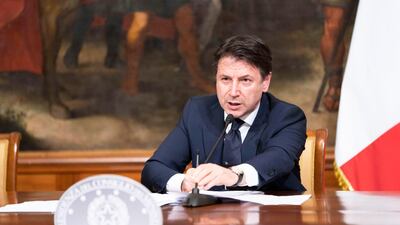Italy may look at easing lockdown measures brought in to contain the coronavirus at the end of this month after the hard-hit country’s rate of infection slowed to one per cent, the Italian prime minister said.
But Giuseppe Conte also warned that the European Union “had an appointment with history it could not miss”, and was at risk of collapse if the wider response to the Covid-19 pandemic was mishandled.
The latest figures show a significant fall in the infection rate in Italy, which went from a seven per cent daily rise in positive cases a fortnight ago, to a little over one per cent now. This decline suggests that the national lockdown imposed on March 9 is working.
The country's daily death toll two weeks ago was 919 - at that stage a record high - and was 542 in the past 24 hours.
"We need to pick sectors that can restart their activity," Mr Conte said. "If scientists confirm it, we might begin to relax some measures already by the end of this month,” he told the BBC on Thursday.
But he warned that the lockdown could only be lifted gradually and that the country should not lower its guard.
The Eurogroup, comprised of EU finance ministers, is set to re-convene today after a failure earlier this week to negotiate a coronavirus bailout fund for the most beleaguered countries.
Mr Conte said that the bloc must show solidarity and act in a co-ordinated way to the crisis to ensure that it did not fail as a project. He called the coronavirus pandemic "the biggest test since the Second World War", echoing comments made by German Chancellor Angela Merkel on March 18.
"If we do not seize the opportunity to put new life into the European project, the risk of failure is real,” he said.
During marathon Eurogroup talks – which began on Tuesday and went on until Wednesday morning – some progress was made: a new temporary €100 billion unemployment reinsurance scheme and an increase in the lending capacity of the European Investment Bank were agreed.
But the finance ministers of Italy and the Netherlands clashed over how to design loans for the €500bn bailout fund using the Luxembourg European Stability Mechanism (ESM).
Roberto Gualtieri, Italy's finance minister, said that ESM loans should come with no guarantee from countries receiving the money to carry out economic reforms in the future. But the Dutch finance minister, Wopke Hoekstra, disagreed, and urged for tougher conditions to be attached to credit lines.
“We think it’s sensible to combine the use of the ESM with certain economic conditions,” Mr Hoekstra, said, adding that it was too early to agree on the bailout fund.
Italy has also been supportive of so-called “corona bonds” – shared debt that all EU nations would have to pay off, but the Netherlands has opposed the idea.
Germany’s finance minister, Olaf Scholz, on Wednesday appealed to the Eurozone governments to find a compromise.
“As we are counting deaths by hundreds and thousands, ministers of finance are playing on words and adjectives,” said his French counterpart, Bruno Le Maire.
“That’s a shame for finance ministers, a shame for the Eurogroup and a shame for Europe," Mr Le Maire added. "We should have a common understanding of the gravity of the crisis and decide on a strong common response.”
The coronavirus has killed almost 18,000 people in Italy and more than 89,000 worldwide.


















